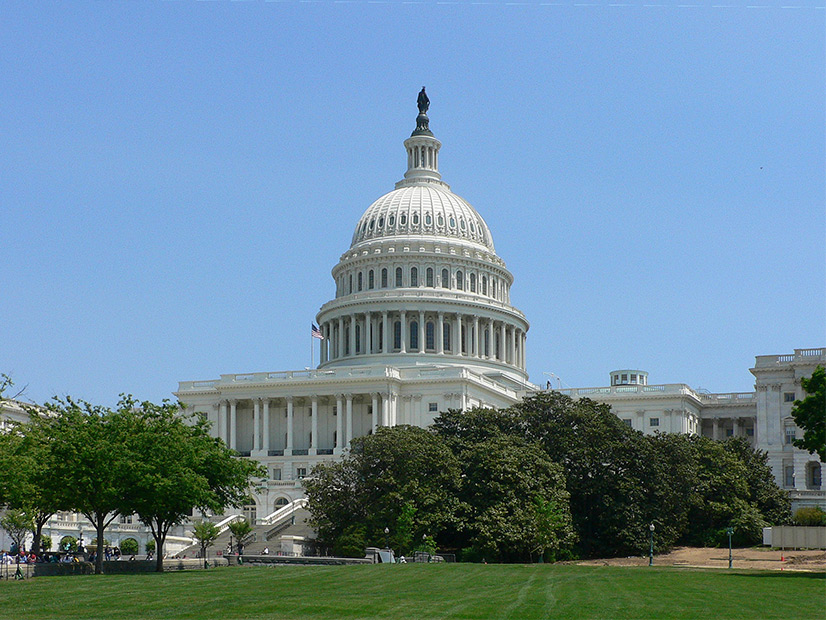
With less than two weeks until the Oct. 31 opening of the U.N. Climate Conference in Glasgow, a group of congressional Democrats rallied on Wednesday in front of the Capitol with the goal of cutting through the current political wrangling over the budget reconciliation bill and getting it to President Biden’s desk before the summit.
“This is not a time for politics,” said Rep. Andy Kim (D-N.J.), noting that he is one of seven Democrats in Congress whose districts voted for former President Donald Trump in 2020. “This is not a time for you, for me or others to be thinking about how is this going to affect my race in 2022.”
“History will not judge us by the [bill’s] price tag, however that’s debated,” said Rep. Kathy Castor (D-Fla.), who chairs the House Select Committee on the Climate Crisis. “History is going to judge us by our determination to do the right thing at the right time before it is too late.”
The bill, dubbed the Build Back Better Act, contains many provisions for mitigating climate change sought by the Biden administration and progressive Democrats. As a reconciliation bill, it would not be subject to the Senate filibuster, requiring unanimous Democratic support in the evenly split upper house. But it has encountered opposition from Democratic Sens. Joe Manchin (W.Va.) and Kyrsten Sinema (Ariz.).
Sponsored by the League of Conservation Voters, the press event provided the lawmakers an opportunity to preach about the increasing threats and impacts of climate change. They also underlined the high stakes for U.S. leadership on climate action before the U.N. conference.
Sen. Ed Markey (D-Mass.) said, “The Senate must put together a climate package [so that] Joe Biden can say to the rest of the world that we are the leaders and not the laggards, because you cannot preach temperance from a bar stool. You cannot tell the rest of the world what to do if you, as a country, are not doing it yourselves.”
“We must save this planet that we will pass on to future generations. It would be a dereliction of duty to build the infrastructure of America without doing so in a green way that protects the planet,” House Speaker Nancy Pelosi (D-Calif.) said, a seeming reference to the Senate-passed bipartisan infrastructure bill that Democrats have refused to pass without first passing the budget bill.
As originally introduced and passed in the House, the $3.5 trillion budget reconciliation package not only includes strong climate provisions, such as incentives for electric vehicles, but also a raft of social programs, including free pre-kindergarten and community college education and an expansion of Medicare and Medicaid.
But beyond the price tag, the bill’s Clean Electricity Performance Program (CEPP), which would pay utilities to accelerate their transition to clean energy, has become a central pain point. Manchin opposes the $150 billion program, arguing utilities should not be paid for something many are already doing. (See Reports: Clean Energy Performance Program Killed by Manchin.)
As Biden continues negotiations with House progressives and Manchin and Sinema, reports from media outlets including NPR and CNBC suggest that both sides are finding some common ground on key objectives. But it seems likely, reports say, that the final package will come in closer to $2 trillion and not include the CEPP.
Speaking at the rally Wednesday, Sen. Cory Booker (D-N.J.) called for holding the line on core climate funding in the bill.
“As we look at this bill in the final hours of negotiations, we can’t cut funding for natural climate solutions or protecting old growth forests, planting millions of trees in urban areas and restoring our coastal wetlands,” Booker said. “We can’t cut conservation funding that makes farmers part of the solution leading us out of this crisis. We can’t cut environmental justice provisions that are so critical.”
Sen. Ron Wyden (D-Ore.) also emphasized the central role that the taxes and tax credits could play if included in the bill, even without the CEPP. Wyden has long supported a carbon tax on polluters and tax credits for clean energy.
“The more you reduce carbon emissions, the greater your tax savings,” he said. “And that gets us to 73% of the target we want to get to” on emissions reductions.
Taxes may not be “the most glamorous topic in the world,” Wyden said, “But I’ll tell you, at the end of the day, the lobbyists are spending all their time on that, trying to pack every single favor they can possibly pack into this package.”



